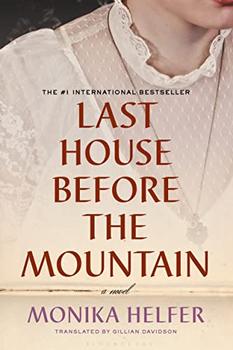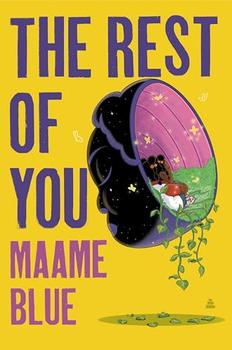Page 1 of 3
There are currently 21 member reviews
for Last House Before the Mountain
-
Lynn D. (Kingston, NY)
Family ties
This novel is written as a memoir, and is based on the author's own family. A granddaughter is recalling her grandmother's life in a remote Austrian village. When her husband is called to serve in WWI, the family struggles to survive through many hardships and the scorn of the villagers. I loved how this book explores both what stories are remembered and passed down through generations and the bonds that hold families together, especially during tragic world events. The stories we are told about our ancestors help us find our own identities. I think it would be a great choice for book clubs.
-
Lynne L. (Tamarac, FL)
The power of memory
Reading Marika Helfer's novel Last House Before the Mountain is like allowing your mind to wander among memories… one bit of the past conjuring another, imagination filling in the gaps that time has created. Points of view change without warning as the memories switch from one character to another. The primary narrator speaks in the first person as she recalls stories of her extended family told to her by relatives as she searches through their lives to discover the truth of her own history.
The house in the title is the home of Maria and Josef – a couple who inspire curiosity, jealousy, suspicion, lust and envy in the villagers from whom the family are set apart. Maria is too beautiful. Josef is too introspective and volatile. Their children are a clan that seems not to need anyone but themselves. As a family, they are referred to at The Bagage, the riff-raff, mostly because of their self- isolation on their remote farm.
The setting is rural Austria. The primary time frame is the period of WWI. The war plays out in the background once Josef is conscripted, although he returns on leave several times. He places his too-beautiful wife under the protection of the town mayor, and here lies the seed that grows into the primary line of the plot. The narrator, the daughter of the one child born when Josef is away at the front, the one he refuses to acknowledge in any way, is on a quest to discover the truth about her mother.
Based on the author's own family history, the novel pieces the stories of all the characters into a narrative that slips effortlessly through time and remembrance. However, the novel is also rich in character development as the children grow into adults. There are the various men who lust after and worship the beautiful Maria, including the emotionally tortured Josef who returns from war a victim although he survives the physical battles. And there is Maria who, above all, wants only to love and protect her family.
The novel explores the idea that beauty, trust, love and faith are fragile and that family is the one place where they must coexist. In doing so, it draws the reader in and holds on to the last page.
-
Lorraine R. (Sonoma, CA)
Last House Before the Mountain
"The Last House Before the Mountain" is a very moving and heartfelt story of several generations—their loves, losses, and secrets. I read it in two sittings and couldn’t put it down. Anyone interested in the exploration of family history and family secrets will love this beautiful story and love the way it unfolds.
The characters are colorful and genuine. Her descriptions of all the members of the Bagage family (as they are called by the villagers) and others in the community like the postman, the mayor and the priest are brilliant. I became attached and keenly interested in each of them. If I were to make a list of each character while I was reading the novel, by the time I got to the end I would be able to describe them in detail. I didn’t do that, however, because I was so interested in seeing how they all ended up. Compelling and compassionate best describes my feelings about this novel.
-
Laurie L. (Warwick, RI)
A powerful, deeply moving family history with rich, memorable characters...
I very much enjoyed this book and read it in a day and a half! Monika Helfer has created a personal and heart wrenching history of her family over the course of four generations. The origin of this story begins with the protagonist - Maria- and her enigmatic husband Josef raising their family in total isolation after they are shunned by the surrounding hostile village community. Most of the characters are richly developed. Maria perseveres as a proud yet tormented soul who has only ever desired to experience" one great love" in order for find her life worth living. The children survive the scorn and torment of the pious local villagers by developing resilience, determination and strong family bonds in the face of extreme hardship. I was deeply touched with one character in particular- the village postmaster- who forms a profoundly touching relationship with Maria. He embodies pure benevolence and symbolizes humanity at it's best. The author masterfully weaves in many themes surrounding wartime, isolation, survival, family love and loyalty. This novel is fully captivating, and therefore would be an excellent choice for book group discussions.
-
Pamela W. (Piney Flats, TN)
Uniquely Written
I'm not a reader that needs a story to be told chronologically, but with this book I took a while to relax into the writing style. The jacket tells the reader that this book is based on Monika's own family history. When I think about the secrets this family held because of their label as Bagage, I realize that she's revealing what she learned in the manner in which she learned the secrets.
I did find the beginning compelling, and at no time did I want to put the book aside. I would recommend it to friends who are avid readers and willing to become immersed in a different time and place.
-
Mary O. (Boston, MA)
Engaging
As a lover of World War II fiction and family sagas, this was a book for me! It was engrossing and quick paced and its short volume made it a joy to read. Definitely a book I would recommend
-
Jennifer H. (Mishawaka, IN)
Austrian family saga
I have to say I enjoyed this book. I could relate to the story in that I had a German grandmother named Maria, whose husband was sent off to WWI. So as granddaughter of my oma Maria, I could put the story into a personal perspective. I guess I could have been in the narrator role. I like the Germanic vibe of the story and the German references. What I did not care for is that it was confusing as to who the narrator really was. And not broken down into chapters! This is the first book I read that as soon as I read the last page, I flipped back to front and reread the first thirty pages, wondering if I missed something! I thought it interesting how everyone lived out the rest of their lives (or died young), and how much seemed negative, like there was a curse of sorts. But given all that, I still enjoyed the book, and might read it again with fresh eyes. i would also like to have seen a picture of the beautiful Maria!




